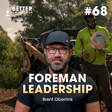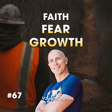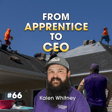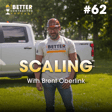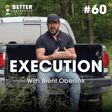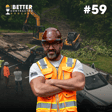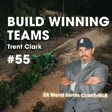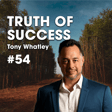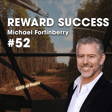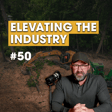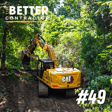Introduction to Jeremy Talboy
00:00:14
Speaker
all right welcome back to another edition of the better contractor today i'm joined by my co-host travis what's up travis what's up man the professor And excited for this guest. So Jeremy Talboy with North Georgia Landscape Management is our guest today.
00:00:29
Speaker
And what I'm excited about with him is I like when we have doers on this podcast. And Jeremy is a doer. He is someone who 15 years ago started this company, and it is now an eight-figure landscape company in the are india Atlanta, Georgia area.
00:00:43
Speaker
So Jeremy, welcome to the podcast, man. Hey, thanks for having me. i appreciate it. Yeah, should be a fire podcast. a lot of good content for you guys that are out there new and in the game, you know, in that seven figure range and trying to get into the eights. So Jeremy's going an awesome guest for you. So, Jeremy, tell me just a little bit about
Jeremy's Unconventional Path to Landscaping
00:01:00
Speaker
you. What got you started? What got you in this industry? Because my understanding is that may have not have been your original plan.
00:01:08
Speaker
Yeah, man, it's kind of a wild story. um You know, I was a baseball player and a history major, and I was going teacher and a baseball coach. And the last semester of college, I decided I was going to take a shot at being business owner. And I sat back and I tried to figure out what would be the easiest to learn because I had very little real world experience.
00:01:27
Speaker
um I had worked in restaurants and I knew I did not want to be a restaurateur, if you will. um So i I chose landscape. I figured it would be the easiest to learn, the fastest experience. that I could learn. Uh, somebody had mentioned to me one time, it's very simple green side up and that's how you do it. And I said, Hey, I think I can do that.
00:01:47
Speaker
So I, uh, I chose landscape as my field and, you know, I had, I had a backup plan to go back and be ah a teacher and a coach if it, if it didn't work out. So, um, I grabbed myself a truck. you know My dad was gracious enough to help me finance a truck and and some equipment. and I had 30 days to make my first payment. and I went out there and I beat the streets. and I went door to door and um started cutting grass. and People liked me and I was able to get contracts, but I learned very quickly that I was a very terrible landscaper.
00:02:18
Speaker
um Again, I had no no real world experience. If i can go back and do it again, I have worked for somebody. Um, got a little bit of experience before I went out there and made a fool of myself, but I was really good at getting contracts. So, um, when I would lose them for poor performance, ah um you know, I was, I could replace them fairly quickly because i I found that I was a pretty good salesperson. So, um, that quickly, um, forced me to, to make some moves and grow and hire people and learn how to build a business.
Initial Struggles and Learning Curve
00:02:52
Speaker
Um, and, and, You know, that's ah that's kind of the most important part about building a business because eventually you got to get out of the field and you got to work, you know, on the company as opposed to into the company, on the business as opposed to in the business. So that's kind of the brief introduction.
00:03:07
Speaker
um I grabbed myself a mower. I went door to door. I made a fool out of myself and I learned everything the hard way. Everything the hard way. Yeah. So what do you think? but How far into like, so you started in 2010, right? Yeah.
00:03:20
Speaker
yeah How far in do you think before you realize that? Like, hey, I need to make some changes, and adjustments, you know, hire the right people and grow this the right way. How how far in was that? Yeah. 15 minutes, 20 minutes. like so I mean, honestly, I mean, and and you know, it's funny, but that's not a joke. So yeah I'll tell you a quick story. When I went and got my mower, it was a zero turn X mark Z 52 or something.
00:03:45
Speaker
And I had no experience. I went down to Howard brothers in Duluth and I purchased this thing and it was huge. And at that point, you know, I had no idea about anything. I was just trying to get the biggest mower that I could get. I figured that would make me the most efficient. Well, in Georgia, we have a lot of hills.
00:04:00
Speaker
It was not the most efficient, but that's not the the meat and potatoes of the story. The point is I had no idea how to ride this thing. And i actually had to have the owner of the the hardware store come and load it on my truck. And he refused because it was a liability issue. Once we got outside the doors, it was on me.
00:04:18
Speaker
And I basically pleaded with him and I said, his name was Doug. I said, Doug, I need you to load this because I don't know what I'm doing. And he loaded it up for me. And when I got home, my dad was like, all right, you need to get it off the truck and you need to start practicing. And I refused because I was too scared.
00:04:34
Speaker
um i ended up driving, like i said, door to door. I found a lady who was a real estate agent. And she offered me 50 bucks to cut her property because she was showing it the next day. So that was my first experience. And, um, I mean, I made an absolute fool out of myself trying to get this thing off of the ramp, off the dovetail.
00:04:55
Speaker
So, you know, with a zero turn, you know, you got your handles and it's so touchy. And if you don't have any experience, um, you can get yourself into trouble. But as I'm going down the ramp, you know, I'm going too fast and then I jerked it back. So I'm doing this hop.
00:05:09
Speaker
going down and and the ramp is just going boom, boom, boom, boom. And this lady is looking me and I'm like, it's okay. I got it under control. um so to answer your question, it was, it was, uh, it was immediately.
00:05:22
Speaker
Um, like I said, I wish I could have, if I could go back and do it differently, I would have got
Building a Strong Team Culture
00:05:27
Speaker
some experience. I, I, I have been very blessed and very lucky to have made it this far with the way I began.
00:05:35
Speaker
so uh, but I, I started studying, you know, business, I was watching a lot of um shows on, on MSNBC, like Shark Tank. And there was a show called The Prophet ah with Marcus Limonis and, you know, Bar Rescue and all these sort of business type shows. And that's where I got kind of bit by the bug. And I just, I didn't give up, you know, I could have very easily gave up that day, and turn the keys back into my dad and said, you know, let's sell this off and I'm going to go do something else. But I stuck with it. And
00:06:06
Speaker
As I said, you know it wasn't easy. I made a lot of mistakes, and that's just kind of the very first mistake that I made. um But I stuck with it, and i was able to adapt and learn and grow. um And I paid attention to successful people that they can kind of show you the way that things are to be done. And then I saw other people that had pretty successful landscape companies, but they had a lot of problems. And they from observing them, I was able to see kind of how not to do it.
00:06:35
Speaker
So I got there's a lot of landscapers around here. If you just kind of pay attention um and you're eager to learn um through observation, you can learn the right ways and the wrong ways and kind of get ahead of things. So did you have some growing pains in the beginning?
00:06:51
Speaker
Yeah. yeah More like a like employee, like hiring and stuff like that. Yeah. I mean, I still have them. Yeah. I still have them. You know, labor labor is one of the the biggest challenges for us. And that's, that's you know, the the guys that are crew members that are out in the trucks every day, all the way up to your your management, your sales guys.
00:07:12
Speaker
um It's tough to find good help. You know, it it is. And being a business owner, you kind of run into that whole, you have your way of doing it. And when you have a hundred employees, not everybody's going to do it the way that you do it. So,
00:07:26
Speaker
You have to really learn how to manage individual people. Everybody um needs to be managed managed differently. um And that is something that I'm learning as I go. Again, i don't have a business degree.
00:07:39
Speaker
I didn't have a business prior to this. I don't have any landscape. Well, have 15 years experience now, but prior I had nothing. So I'm still learning a lot of things as I go, um trial and error.
00:07:50
Speaker
And again, observing and trying to learn as much as I can. um The things I'm learning now are a lot different than the things I had to learn back then. But again, you're just always learning, always observing and just be a sponge.
00:08:02
Speaker
Yeah, that's good. And you mentioned the team and like culture there. And there was something I was reading about you somewhere before the podcast. And you had mentioned or the article says something about like you were known for building a strong team culture.
00:08:15
Speaker
And I think that's super critical, especially in today's market for hiring to begin with. But then once you hire, also retaining. Is there any tips or any thoughts you have around like how did you build that strong team culture? Because we do know the landscape business, lawn care business is one that does battle employee retention.
00:08:35
Speaker
Like it's really, really high in that industry for multiple reasons. so Yeah. So for me, being a coach and a baseball player, um you know, I kind of approach it like that, like putting a team together.
00:08:47
Speaker
um i try to find people that fit the role that I need. you know whether it be ah a starting pitcher, a closing pitcher, a leadoff hitter, whatever the case may be. You try to try to fill that hole. But most importantly, you build that team feeling, that family feeling, right? So um for instance, on Monday mornings, we have um our Monday morning meetings.
00:09:09
Speaker
We start at 7.30. All my managers and salespeople are here. And we sit around the conference table and we spend literally the first 30 to 45 minutes going around the table,
00:09:20
Speaker
telling everybody how our weekend was, what we ate, the kids' sports, date night with our wives. And you know I think that is super critical in in building ah good culture because we're we're we're not just coworkers, we're we're family.
00:09:39
Speaker
And when people come into this company, it's hard for them to leave. And a lot of times when people do leave, you know, on their own, they end up coming back because they go out back out there to the real world and they start missing it.
00:09:53
Speaker
um And they say, you know what, what we had over there, that feeling that we had over at NGLM was just something different. And i want to get back to that. So um we have a lot of people come back after they leave. But, but the, the reason is, like I said, it's, it's that family feeling.
00:10:08
Speaker
And so when you have a family culture like that at a business, you really learn how to win together And you learn how to lose together. And when you lose together, you you adapt together and it helps you win more together. So we celebrate a lot of wins, um, in this building and, and we do it all together. So that's, uh, that's kind of my, my philosophy when it comes to that building a good culture is just treat everybody like family.
00:10:35
Speaker
And, uh, you know, when the meeting's over, then it's time to get down to business and and we all go our separate ways and we have our roles and our tasks and our goals for that day. But, um, We're doing it all together.
00:10:46
Speaker
Yeah. How many people is employed by your company and and and how many people you have in your management staff, like non non-field workers? Yeah. So peak season, um you know, obviously we fluctuate right now.
00:10:59
Speaker
We cut down to the skeleton crew um for our maintenance side. But, you know, we have we have installers. We have construction side. We got all that stuff. So peak season, we're right around 100 in the low in the low ninety s um And if we get behind, we have to go hire some people, some temp people ah to help us.
00:11:19
Speaker
Let's see. We got six management on the maintenance side. We got five on the install side. And then there's myself and my wife um runs the office.
00:11:32
Speaker
Okay. So however many that is. Yeah. 13, 14. Yeah. yeah The reason i ask is I was kind of curious of the make-up number one, but number two, How did you help to instill that culture into your management staff and then make sure it gets from your management staff out?
00:11:48
Speaker
Yeah, so, you know, i that's kind of a ah tough question. We just started by having meetings together. And um I don't know if I got this advice from somewhere or surely I didn't come up with it myself. But as I said earlier,
Balancing Professional and Personal Boundaries
00:12:02
Speaker
man, start your week with just let's go around the table and let's talk about our weekend. Let's talk about our family because you start building that, that camaraderie. But I, I know J.R.' 's wife and I know J.R.' 's daughter and I know Stuart's wife and I know Stuart's son that's on the way.
00:12:19
Speaker
And you know, they're going through a pregnancy right now and it's his first kid. So, um most everybody at the table's got kids. So he's going through that, that experience for the first time. And we just sit there and we really talk about it.
00:12:31
Speaker
And for the first time, I would say, i don't know, hour of your week because it's Monday morning, right? Monday mornings are hectic, man. Monday mornings set the tone for the whole week.
00:12:43
Speaker
And when we just come in and we just break, break the ice and it's, it's, there's no stress involved. It's just basically, man, I had a really good weekend. My wife and I had a date night on Friday. We had sports all day Saturday. We went to church on Sunday.
00:12:58
Speaker
um You know, it just, it it starts your week off right. But that's how I, I, in my opinion, that's how I was able to build this family culture. um i mean like that. It's very organic. I like it.
00:13:11
Speaker
Right. And after we get but get, you know, I always go last. We go around, and then they ask me, and I tell them. And then ah when I'm done, it's like, all right, let's get down to business. What do we got pending this week? What do we need to focus on? What do we need to to do better from last week or or whatever the case may be? But it really just sets the tone, and it sets the pone the tone for the week with positivity.
00:13:32
Speaker
Yeah. everybody everybody loves talking about their family and, and all the fun they had over the weekend. And like I said, when a lot of people, when they wake up on Monday morning, I mean, it is a thing. It's the Monday morning feeling, you know, peter Monday mornings suck.
00:13:48
Speaker
So by, by taking something that sucks and turn it into something that's just easy and fun, it really just sets the tone for the week.
00:14:01
Speaker
And it transcends beyond just that week into the whole culture of the company. And then from that point, to answer your question, you know, the managers go off and they do their thing. And now they're going to but their departments and they're they're taking that positivity with them. So it trickles down all the way to the boots on the ground.
00:14:22
Speaker
Nice. I like that. I like that. One of the things, you know, I had someone... Well, mentor of ours basically said like you can't scale chaos, which everybody knows is very true.
00:14:32
Speaker
So part of that is obviously a good team, which we've talked about. The other part of that is like systems and processes. It's kind of curious how much of a role that has played in your growth. Yeah. So, you know, um in the growth of a business or a company, you know, you have certain points, you have break points.
00:14:50
Speaker
If you ever read anything Grant Cardone has written, he talks about these break points. Around, ah you know, from 300,000 to a million, there's a break point. And then from a million to about 3 million is another is another break point. And he breaks down, you know, the the primary focus of each of those break points. And so when you get to a million, that's when you really need to start focusing on systems and processes.
00:15:22
Speaker
Before i I got to a million dollars in revenue, I mean, if I was to go propose a a backyard for a homeowner, it was a Word document. um We put in the project elements. you know We typed everything up.
00:15:38
Speaker
We were doing two, maybe three quotes a week on a good week. you know So it was manageable to do that. We were doing one job at a time with one crew. So our system was Microsoft Office and Word and spreadsheets.
00:15:52
Speaker
um And then all of a sudden, you know, our reputation kind of propelled us into, well, we have six or seven or eight proposals to knock out this week. So how do we do it more efficient?
00:16:04
Speaker
How do we take it from, you know, three hours, four hours per proposal to 15, 20, 30 minutes? um So that you have to have a CRM for that.
00:16:16
Speaker
um And there's plenty of them out there. I personally use Jobber. um I'm a big fan of Jobber. Um, it has helped catapult me, um, through a couple of different break points. And then, um, you know, another big key to, to getting past that is having somebody dedicated to answering the phone.
00:16:33
Speaker
Um, you know, you're starting to, at that point, you're probably starting to spend a little bit on marketing prior to that. It's all word of mouth and, uh, referrals. Um, so when when you get towards, towards a million, you're going to start, Hey, I have all this extra money.
00:16:47
Speaker
You know, what am I going to do with it? I want to grow. So you start spending money on marketing. Well, marketing money is no good if nobody's on the other side of the phone. i mean, everybody knows that um if your HVAC goes out and you're calling HVAC people in in on Google, first guy doesn't answer, you're immediately going to the second, so on and so forth. And the first person that picks up the phone and says, I can be there today or whatever the case may be, they win. So um that's another part of the systems and processes, right? You got to start with the marketing.
00:17:16
Speaker
You got to have somebody that answers the phone. And then you have to have a CRM for that person or yourself to enter everything into you and the to keep you organized and to make you efficient. As I said earlier, you know, going from from proposals for a backyard renovation, taking four or five, six hours to type it up.
00:17:34
Speaker
And, you know, being just a Word document on your on your hard drive to take it 15 or 20 minutes. And now it's cloud-based and you can access it from anywhere. You have a app on your phone. So um those are the break points that, that um I have already been through, and that's how I was able to navigate those
Company Growth and Future Goals
00:17:52
Speaker
successfully. Now I'm at at another break point um where we really focused on personnel and um the C-suite kind of people, the CEOs, the COOs, the financial guys to come in and um really hammer down on budgets and labor budgets and and really dig into the financial side and say, hey, you know we got this big machine that can just generate revenue.
00:18:18
Speaker
But let's how do we navigate through all this stuff as efficiently as possible and make it as profitable as possible and sustainable and attractive to buyers or mergers and acquisitions, whatever the case may be. So that's where I'm at.
00:18:33
Speaker
um And just to clarify, last year, um we did $7 million, something like that. We were on – I got a couple really big contracts, and we added the pool division.
00:18:46
Speaker
um So my target for last year for 2024 was ah about $20 million. um But unfortunately, we didn't we did not hit that. So I i was only able to do $8 million last year.
00:18:58
Speaker
So I went from $7 million to $8 million. I had a $5 million dollars project that got um phased out. And we we completed $600,000 of it. And the other two phases are going to be deferred to 2026, I believe. it's It's a bunch of big construction stuff.
00:19:16
Speaker
And then with the pools, um I anticipated doing about 20 of those this past year. And, so you know, if anybody knows anything about pools, the permitting and all the stuff that goes with it, that the the sales cycle of a pool can be several months.
00:19:31
Speaker
So we were only able to complete two. ah But right now we have seven or eight, I think, in production. So but we've made it through that first, you know, period of getting a lot of contracts and getting um permits submitted, but permits can take eight, 10, 12 months, depending city of Atlanta. I mean, 12 months if you're lucky.
00:19:51
Speaker
um So they're all starting to really cycle through. And now we're, we're starting to to see the rewards of that and the fruits of that. um So this year, I think, you know, with that big project being deferred another year, um i think we'll probably, I'm shooting for 12 to 15 million. So I just wanted to clarify that. I know I,
00:20:10
Speaker
I've said on another podcast that we were going to hit 20 million, but that was with all that considered. And that was kind of a goal, but um unfortunately that big project fell through. So, um but still we're rocking and rolling and we're going in the pool division has really, really taken off.
00:20:27
Speaker
um So hopefully this year I'd like to get 20 in the ground. And like I said, anybody that knows anything about pools, I mean, they're starting at 75,000 bucks and, cool thing about us is we do all the landscape around it, too. A lot of pool companies just specialize in the pool, right? So I do the whole thing. So and these tickets are $120,000. We got two of them that are contracted that are over $250,000 because they're all they have all the walls, all the everything. So I think we have a good shot of hitting that goal. But, um again, I did want to clarify that.
00:20:57
Speaker
Um, we did not hit 20 million. That was my goal. but We're shooting for it. It will be there soon. Yes. I like it. I like it. will be there soon. Yeah, no, I love it. Um, I'm going to let you do the next question, Travis, after I asked this one, this is one I had, I got, I got like three or four. Hey, you take one, you take one.
00:21:16
Speaker
I might take two. Um, all right. So it's one of the things i love about you, Jeremy is the humility. Um, the harmunist And I think that resonates with people in that willing to share challenges in, in a world of social media where everything is projected as was easy. I'm a multimillionaire, ah not showing whether it's true or not, because it actually might not be true.
00:21:46
Speaker
But let's say that it was true that they were ultra successful in that it doesn't show the grit, the the the effort that it took to actually get there.
00:21:58
Speaker
And I think it's so important because i think we're living kind of through a golden age in that entrepreneurship and maybe a pivot yeah in what do I do want to do with my life in the sense that how do i want to provide for my family? What kind of mark do I want to make on this earth has pivoted away from or at least opened up the aperture as far as I'm going to a traditional, I guess advice would have been, you go get a degree, you go work for somebody and then you go work there for 20 years, 30 years, whatever. and And that's, that's what success looks like.
Impact of Societal Changes on Business
00:22:42
Speaker
I think through a variety of different things that there's been a whole host of people that are looking for alternatives. realizing that might not be the best path for them.
00:22:54
Speaker
So when, when they start to, whether it's somebody who embarked on that journey, as far as I'm going to go work for somebody else and realizing like, this is not for me. And they chose to do a career pivot or it's somebody coming out of college or somebody coming out of high school, uh, saying like, I know my path is different than what may be traditionally been,
00:23:19
Speaker
ah the advice as far as going, going to be an employee for somebody. It's not, it's not easy. um There's a whole host of dangers and traps and pitfalls and things and challenges and setbacks and things that.
00:23:34
Speaker
yeah So I appreciate you being one of the ones that is willing to to talk about the challenges and it wasn't easy and that you didn't know it all. And um you are human and that you did have challenges and,
00:23:50
Speaker
ah I think that helps people that are choosing to embark in this journey that, man, I didn't have it all figured out and you won't either. And I can still be successful in it.
00:24:04
Speaker
ah So I appreciate that. and And one of those that you were talking about earlier with the creating a family-like environment. So whether whether people have paid attention to different people on podcasts or different content that's out there or corporate buzzwords of creating a family like environment.
00:24:27
Speaker
So there, so I came from the corporate arena, the like major global corporate environment. yeah And most meetings were not pleasant. And ah in the sense that they weren't confrontational or adversarial, but it just wasn't enjoyable. It was all business. And,
00:24:47
Speaker
There's a lot of egos involved and is more in the the sense of less productive than productive. But there was a dynamic that happened in COVID that I think speaks really well into what you were just talking about as far as having your Monday morning or like round tables, if you will, and having it being personal.
00:25:06
Speaker
And that early days of COVID, when everybody was jumping on cameras and you're having Zoom meetings or whatever, there was the occasional... family member or mom or dad that had their like three year four year old jump into the picture and you're like oh and and and traditional traditional mentality was like oh my goodness that's super unprofessional and that was their initial reaction of oh i'm so sorry guys i'm so hey hey get it get it but that this this little figure jumping into the picture of a little kid um innocent and doing something fun and it's
00:25:47
Speaker
the the initial parents that had that happen to were mortified. Like, oh my goodness, one of my coworkers, thing they're apologizing. You almost instantly saw, and because had kind of this Brady Bunch figure, like all the boxes of everybody that's attending the meeting, because you could see everybody's reactions.
00:26:05
Speaker
yeah Yeah. Almost a melting of the faces, and that they actually found delight in that. ah You saw like some of the hard figures, the senior executives, or whoever it was, or the most stern individual that was demanding about your missing timelines in your project or whatever were smiling ah and were engaging in in human ways.
00:26:29
Speaker
And it was kind of an unintended consequence of of that in that
00:26:39
Speaker
from that point forward from the meeting, it was a lot more relaxed. That's right. It was a lot more lighthearted. like It was a lot more. It became human, like humanized the people on that call.
00:26:52
Speaker
It humanized the people in that meeting and that they saw each other as peers, as humans, as fathers, as sons, as brothers, as sisters, not some department head of some group that was trying to steal your budget or was in competition for attention whatever.
00:27:11
Speaker
But that actually brought teams together in ways that we'd never anticipated. It humanized us and brought us together. And so I love the story of you bringing the team together and having conversations.
00:27:23
Speaker
And maybe it felt artificial at first, but I'm sure with with as you continued that, you developed connections and you humanized the people in that room. You humanized the connections between them.
00:27:38
Speaker
They saw each other as Bill or Bob or Amy or Jack. at As humans, as a mother, as a father who's really trying to do their best and they're not some corporate or business pawn.
00:27:51
Speaker
ah And ultimately people are trying to achieve that because they know the strength that's provided. So i had ah I have a military background and and serve overseas.
00:28:02
Speaker
And the stories that come out of a lot of the the combat engagements are, well, I didn't fight for anything other than the brother beside me to my left and my right. And that becomes very real in that you wanted to serve them and you saw them as humans and you wanted to protect them.
00:28:24
Speaker
And that's very similar to what you created. and it's what a lot of companies desire to create. But it has to be genuine and it has to be authentic. It has to be, I do see you as a human. I do care about you.
00:28:39
Speaker
It's not just some random story that I'm checking the box. So I realized that I ah kind of filibustered on that on that thing. Yeah, well, yeah that's exactly exactly what you were talking about. I mean, I agree with that wholeheartedly.
00:28:53
Speaker
You know, when you see a little kid come in to the picture of a ah ah Zoom meeting with 15 or 20 people that are all, like you said, you know, corporate. It's very, ah for but lack of a better word, word very tight ass, right?
00:29:06
Speaker
You know, everybody is just on edge. Am I going to get canned at you know, is somebody coming for my job is who's going to get the promotion. We don't have that here. Um, and when, when a little girl comes into, into the picture, it just breaks all that down and, and people let their guard down for a little bit. And then you just become a bunch of people sitting around the table.
00:29:26
Speaker
Um, and like I said, when, when you do that, um, consistently, you become family. And like you said, you become Bob and Bill and Sally and Amy, instead of, um,
00:29:39
Speaker
you know, the CEO, the CFO, that this division head, this department head, and you just are now just people. And so to the the military example that you use, and I said it a little bit earlier, we go and we win together, and we fight together, and we lose together, and we we learn together.
00:29:58
Speaker
And that is, that has been super beneficial to the success of my company. When you can have people that that leave the conference table at 9.30 in the morning and go out all their different directions and they're all fighting for the same thing, for the same success, for the same reputation, um for the same results. It's a powerful thing.
00:30:22
Speaker
but but you You empower your people by um making them part of your family. and That's the best way I know how to do it. That and a lot of yeah cookouts and you know Friday night cookouts on payday when, so we work for four days a week.
00:30:41
Speaker
Um, and the guys come in on Friday to get their paychecks. Friday is kind of a rain day. Um, if we need to make anything up. So we like to cook out and we, admittingly we didn't do it enough this past year.
00:30:53
Speaker
Um, but this year I'm going to make it a point at least once a month, we're going to have a little powwow. We're going to do tacos. We're gonna do pizza. We're going to do burgers, whatever the case may be, and just crank up the music, man.
00:31:05
Speaker
And, uh, going to the weekend with with just a bunch of wins and and a bunch of positive feelings so that when we come back Monday, we can talk about what we did over the weekend and and go battle again.
00:31:17
Speaker
So it's super important, no matter what industry you're in. What you're saying people will see that as something they read out of the book, of a business book, or they'll see it on a podcast. We create a family environment by doing these things. They can't be just check boxes. All right. We had a family, we had a cookout, um, and it was so superficial and nobody cared about each other and everybody felt awkward being there. Um, they actually have to feel the love and they have to feel like a family. So you have to treat them like, ah yeah, and that comes, you have to actually care about them.
00:31:50
Speaker
Um, you have to see them for who they are, uh, see them for the human aspects. And the the fact that you've seen success through that shows that you're doing something, whether it was intended or not, but,
00:32:02
Speaker
ah shows that you've actually accomplished it and and it's super important and people will see that and try and replicate it, but they have to know it has to be authentic. It's not up yeah it's not a checkbox, um, yeah but the power that it creates, uh, in both attraction of talent, retention of talent, um, of, uh, people going above and beyond for each other, have feeling a part of the team. Everyone wants to be a part of a winning team. Um,
00:32:32
Speaker
So those are all critical aspects. And I think that most people in any industry, including this one, is super powerful for.
Maintaining Business Relationships
00:32:40
Speaker
If they can create that familial type environment where they care about each other and they all feel like they're part of the same team, it's a superpower for them.
00:32:50
Speaker
That's right. I will say, though, um there is a downside to it. um There are times where you get so close to somebody and they may not be doing their job.
00:33:01
Speaker
um, quickly or efficiently or correctly. And, um, it's very hard to discipline them or reprimand them or terminate them if the case calls for it.
00:33:16
Speaker
Um, because you now have put them in a different box and you see them differently and you really, you have a connection to their, their wife and their kids and their family and you see them on Facebook and, yeah um,
00:33:29
Speaker
you know, they become part of your family and it's like, I mean, I just got to give them another chance. and you know, if I could just and'll provide ah some coaching and a corrective action, then maybe they won't continue to make that same mistake that happens to cost me a lot of money um and cause me a lot of problems.
00:33:47
Speaker
Um, and it's very hard to sometimes set aside that personal connection for, hum the the the the health and the sake of the business. And, you know, my wife is very good at reminding me that, you know, it's it's nothing personal.
00:34:03
Speaker
It's just business. And to still treat, to to find that balance or that winning formula to where you can still treat everybody like family, but still um do what needs to be done if something needs to be done.
00:34:20
Speaker
um And there was times in the past where I've felt like I did get taken advantage of by being getting too close to people. Um, but that was when I was much smaller. Um, it's not as big of a problem now, but it, it's not perfect.
00:34:37
Speaker
There are challenges that come with anything. And, uh, that's the one that I've really, um, struggled with over the last couple of years because, you know, it's hard to look your brother, right?
00:34:49
Speaker
Essentially your brother in the eye say we're just going to have to go in a different direction. um you're not You're not performing the way that you need to, or you keep making the same mistakes and you're not learning.
00:35:01
Speaker
um So, you know, it's not not always roses. so So I've heard, so there's a dichotomy to that. and So I've heard of both sides of it, and I've experienced both sides of it in the sense that
00:35:18
Speaker
A lot of it is, so so I'll go back to the military analogy. So one of the first things that we take out in the onset of a battle is communications. And there's a variety of reasons why that that is so important, whether we can capture it or we take it out completely.
00:35:34
Speaker
It creates confusion. It creates chaos. It doesn't allow them to coordinate. They don't understand what's happening. They can't coordinate in a counterattack. They can't become a cohesive, if they were a cohesive element, they no longer can be a cohesive element because they have no idea what is impacting for positive or negative to each other. So communication is so critical.
00:36:01
Speaker
um And I've seen it throughout my career too. And I think it's present too. I've heard business owners say, I hired all my friends. yeah And they're multi, multi, multi,
00:36:16
Speaker
millionaires, so but what billionaires at this point that I've heard other companies like, man, I hired my friends and it was, it was disastrous tank dust. Both can't be true at the same time, but it can in the sense that, well, if there's not one rule that dominates all ah there, there's probably some elements in there, whether you hired the right people, where you had that relationship. And so there, there's probably,
00:36:43
Speaker
some truth somewhere in between there in that you hired some of these people because, i mean, I would hope that, uh, business owners hired people they, they knew that they can trust and had good heart and good intentions. And so so there, there's elements and nuances in there in that if the majority of the people that, that it's tough to, to hire for is talent, uh,
00:37:09
Speaker
I know I can trust them. I know they want to do a good job. I know they're on my team and I want, and I know that they'll, they'll push the bounce. And then there, there's nuances beyond that, but, um, finding the people that you can trust and that you can rely upon are probably some of the more core foundational components and other things that you can build
Public Profile and Reputation Management
00:37:29
Speaker
Um, so if those were the ones that you hired, assuming that that was the hiring criteria, not just because it was a buddy and I felt like I owed them something, um, But I know that I can trust them. I love them. And they love me. And I know their family. And we're solid.
00:37:45
Speaker
If something goes awry, maybe that's not the the component ah in the sense that may – so I've seen it happen where the communication break broke down in that the communication wasn't – so something changed or there was an element that that pivoted in there.
00:38:03
Speaker
But the communication channels weren't open that one party didn't feel comfortable communicating to the other in an honest fashion. They thought they were going hurt feelings or there was some other barrier.
00:38:14
Speaker
And then as soon as the communication broke down, the chasm increased. And then assumptions got filled into that cal and cavern, ah ah things that – illusions of what might have been transpiring – And so it maybe separated components. And I'm not saying this was your case in yours. I have no idea what was your case. But I know from the the examples I'm looking at. ah so So what happened is maybe a solid person that could have been an integral component to that organization through lack of communication for a variety of potential reasons.
00:38:55
Speaker
actually separated maybe a really solid person out of their organization. And and there's oftentimes that people are hired out of their depth. I know I had been in several cases yeah and they grow into, or maybe a part or when it morphs into something that they, they didn't intend or a thought that was maybe their skills were, were more ah applicable in another area. Can you read,
00:39:25
Speaker
reposition them so if you know that you love them, they trust them, yeah can they serve a different purpose in your organization? So that was one that got brought up. I'm actually going to pivot this so I'm not filibustering. I love this conversation because it's something that whether people deep dive into in psychology, in the nuances of owning a business and and an organization, a running organization that often no times don't get talked about.
00:39:52
Speaker
But So you mentioned Grant Cardone. we had We have a really great relationship with another company that we had on the podcast. and We do business with ah Precision Landscaping app that did Cardone Venture and engaged with them and did the trade.
00:40:07
Speaker
Did you actually engage with that? No. Did you sign up? No? yeah No, I went out and I i did the whole spiel, but um I don't know. I just, I really want to do it myself.
00:40:19
Speaker
Yeah. because ah So so that they did the the thing where they went down to Florida and and it was transformative for them. So the 10X, the Brandon Dawson, and the Cardone Ventures and stuff, yeah it was transformative for them. And and there were they were saying a lot of the same things that that you were doing. They actually pivoted and bought another company and brought it in.
00:40:41
Speaker
So this gets into kind of the marketing and marketing in the modern age and presenting yourself. um You obviously don't need to do podcasts or maybe you do. um so So you're at a level that traditionally or historically people were like, all right, dude, you're running a successful company.
00:41:03
Speaker
You really don't need to get out there and do interviews or podcasts or or present yourself. you Your company can go run. ah Given the age that we live in,
00:41:15
Speaker
being that you have been successful, why do you continue to do podcasts and why do you continue to do social media and put yourself out there? Well, there's a couple reasons. I think it is important to continue doing that stuff.
00:41:27
Speaker
um No matter how big you are, ah Grant Cardone, wow for example, you think he's just sitting at home. No, he's still promoting and that man is wildly successful. But two, I also like giving my perspective um to people and, and,
00:41:42
Speaker
Maybe they can take away something that will help them because this is how I learned. As I said in the beginning, there was a lot there's a lot of landscapers around the Atlanta area. um And there's people that you can observe and that you can learn all the right ways to do things. And there's people that you can observe and you can say that that is not the right way.
00:42:02
Speaker
And you can actually learn just as much, if not more, from the people that are doing it the wrong way. And I'm not saying I'm either one of them, but um people can listen to me and they can... bacon um, learn something. So, uh, I, I'm at the point now where I do really find a lot of joy, um in somebody coming up to me at a trade show and saying, Hey, I, I really enjoy your videos and I've learned a lot from you because I remember when I was younger, um, I was listening to people like Keith Kalfas and Jonathan Patochnik and, um, Paul Jamison, all these people. and And that's how I learned.
00:42:39
Speaker
Um, So now I'm kind of in a position where people are listening to me. um And it it is very gratifying. I really enjoy knowing that I've helped somebody. um And for me, it's not, you know, i my business, obviously, I do want to to make a good living.
00:42:58
Speaker
I want to give my children um everything that I didn't have. But what's most important to me is not really the money. um It's my reputation as a person.
00:43:09
Speaker
You know, I've hired a lot of people or interviewed a lot of people that just come in here and they trash their old company and their old boss. And i all I sit here and I listen to them. And in my in my head, I say, you know, I do not ever want somebody from my company to go interview at another company and just bash me. um Maybe maybe we we saw things differently. It didn't work out. There was a better opportunity. But, um you know, I want people to leave and say, you know, Jeremy's a good man.
00:43:40
Speaker
And but you should go work for them. You know, um i think the reputation, your reputation is worth far far more than all the gold and silver out there. So, um and this is ah another way to give back. So um that's why I continue to do it. But it is, it is good publicity. um You know, I can take these clips and I can put them on my Instagram and um I can gain a little bit of notoriety. It does add to my credibility, um even with my clientele.
00:44:10
Speaker
You know, if I'm trying to go sell a contract to a big ah property management group, the fact that I'm, you know, asked to be a guest on such a prestigious podcast as yours, you know, it it helps, you know, but it helps. So, and I put it on, you know, I use a lot of um social media. LinkedIn is big for me.
00:44:29
Speaker
um I find a lot of good employees there. All of my clientele, my upper end clientele is on LinkedIn. You know, we do a lot of commercial stuff. um So this is good content for me.
00:44:40
Speaker
yeah I can pull some clips out of here and I can put it out there and it's essentially free marketing for me. And I can't tell you how many times I've gone to um property management events and people have come up to me and said, i really love all the content that you share on LinkedIn. And I mean, that's good. That drives business. That drives you know name recognition and branding and all that stuff. So...
00:45:02
Speaker
um I think you hit the nail on the head with, ah you know, a lot of business owners think like, hey, what what is something that can be the one negative wisdom for success? And I think you hit it on the head and I love it and i try to live by that as well. But you said it's not about the money.
00:45:17
Speaker
It's about the legacy and doing what's right. And now what I've noticed is with most people I've observed and studied or mentored or whatever or been mentored by. If you do that, usually the money will follow because you're doing what is right.
00:45:31
Speaker
um And I think for you guys listening, girls listening, whatever, that is something to take to heart. I think it's a huge, very simple. It's probably something we've all heard before, but that is the one thing of people that I respect and admire that are business owners that are doing better than me doing where I'm at.
00:45:48
Speaker
That is almost how all of them live. It's not actually about the money. They don't wake up every day and think, man, how can I make a million dollars a day? How can I scheme this million dollars? They are good people doing what they need to do and doing what they think is right. And theyre like you said, it's about legacy. It's about impact. So i love that. And i wanted to highlight that just a little bit more.
00:46:07
Speaker
Yeah. And so to that, like you said, um when you focus on that stuff, the money is kind of just a byproduct and it comes with it. um And so I don't know if you guys can see, but Proverbs 22, one, a good name is rather to be chosen than great riches and loving favor.
00:46:25
Speaker
rather than silver and gold. It sits right behind me on my desk.
Balancing Profitability and Quality Service
00:46:29
Speaker
um Cool story about that. That has always been my motto. That's how my dad raised me. um And he really instilled that in me from the time I was a young child, that if you take care of that, the rest will take care of itself.
00:46:44
Speaker
um And believe it or not, you can get rich by doing the wrong thing, but it's not a good life. It is not a good life. And, you know, you're you're always going to target on your back, whatever the case may be.
00:46:55
Speaker
But if you do it the right way, you can sleep well at night and and you leave this legacy behind when you're gone. um And that that is something super, super cool and super special. And I think about my kids.
00:47:08
Speaker
You know, when i'm when I'm dead and gone, how are people going to talk to my son about my legacy?
00:47:18
Speaker
and People going to come up to my kid and say, your dad was a good man. You know, that's that's really... um That's the legacy I want to leave. But back to this Proverbs 22.1, my birthday is February 21st, so 221.
00:47:33
Speaker
So this has always been my motto. And it wasn't until a year ago that I heard this for the first time listening to somebody. And when he said it, um his name is Marvin Salcido.
00:47:45
Speaker
When he said it, I was listening to him talk and he was talking about company culture and it was a landscape event. um LCR Summit is what it was. And so ah When he said it, I perked up and I said, that's my motto.
00:47:58
Speaker
And it's in the Bible. And i don I mean, I've never really, I'm very spiritual, but I'm not all that religious. I don't really read the Bible, but um I subscribe to the philosophy. And when he said it, I perked up and I said, oh, that is a perfect illustration of my philosophy that I live by.
00:48:14
Speaker
And then he said, it's Proverbs 22.1. yeah Again, my lucky number, my whole life is 221. So it all just kind of fit together. um It's just a really cool story. Um, but yeah, that's, that's my philosophy and that's my motto. There's a right way and a wrong way to do everything. and um sometimes the right way might take longer. It might not be as easy.
00:48:36
Speaker
Um, but in the end it's, it's the way. Well, and it's usually longer lasting as well. Yeah, absolutely. No, I love that. I love that. One thing I know probably that we had down, I had down as a must ask question was there's a lot of business owners who especially in today's market that are struggling to balance profitability while still being able to deliver a quality service, pay their employees well and all of that. and i was curious to see how you've been able to balance that or achieve that in your company.
00:49:05
Speaker
Yeah. So, uh, I, I am, um, just like everybody else. I struggle with that. Um, there are times that I struggle to make payroll, um, in the peak season, my payroll is about a hundred thousand dollars a week, every Friday.
00:49:18
Speaker
Um, there has been many, many times, uh, where Thursday comes and I go to bed and I have, I could be 50,000 in the hole. Um, and somehow I got to come up with $150,000 just to get my people paid.
00:49:31
Speaker
Um, and for me, my biggest issue is collecting my money on time from clients. It's not that we don't make the money. It's that I can't collect it on time. My receivables get so high, you know, doing all this commercial work,
00:49:46
Speaker
Um, that sometimes it it it, it hurts and I have to spend some time on my knees and I pray and, uh, it always shows up. It always shows up. So, um, you know, it's a struggle that I, I don't know if it will ever go away without having financial partners and lending partners that you could take big lines of credit out, which I could do, but I've just kind of put it off until I deem it fully necessary.
00:50:14
Speaker
um, um Best way i I can suggest to work on your profitability is work on your reputation. when you When you have a good reputation in the market, you are allowed to you you now can charge more for your services.
00:50:30
Speaker
And you don't have to spend any more resources. you know If if a property a commercial property, let's say, takes 20 man hours per visit to service you could be charging $40 or $50 a man hour, or you could be charging $60 or $70.
00:50:45
Speaker
And it's still going to take 20 man hours. So you can start charging more when your reputation um hits a certain level and that credibility. And that goes back to what we were talking about. Do I need to do podcasts? And do I need to do all this stuff? I don't i do because that's how I continue to build my reputation and my rapport with these these clients. And obviously, if you can get more more dollars for your minutes, then that's going to add to your profitability.
00:51:12
Speaker
And then on the flip side of that, you've got to control your spending. um, charge more for your, for your, your minutes and control your spending. Don't, don't get frivolous and, um, you know, let the money go to your, you will have good weeks and you will
Personal Legacy and Compassion
00:51:25
Speaker
have bad weeks. There's weeks. I mean, shoot, first week in January, I came back from vacation. I had like three or $400,000 waiting on me and it was just, oh my goodness. Thank you, Lord. Now I wish I had had it for Christmas, but that's okay. Um, but,
00:51:41
Speaker
That's one of those examples where, you know, everything was very thin um at the end of the year and then this big influx of money. um But you you got to understand that it's going to be spread out over the next couple of weeks and don't let it get to your head and go out there buy a boat.
00:51:56
Speaker
You know, I got $327,000 sitting on my desk, um but I have a whole stack of bills. So, um you know, control your spending when when the times are good. ah Just understand that it's a roller coaster.
00:52:10
Speaker
um you know Get more get more more time, more money for your time, more money for your minutes, as we say around here, and control your spending and and really focus on your reputation.
00:52:21
Speaker
And in addition, try to build that that family culture so that everybody's out there trying to win with you. And that's kind of the winning formula, in in my opinion. Yeah, no, i agree with that. And I think you kind of hit on a point, and i appreciate your honesty there.
00:52:36
Speaker
A lot of contractors, you know, don't really talk openly about like cashflow management, payroll and stuff like that, especially in the industries like yourself, where it is a very seasonal business. You go further north than you and it's even more seasonal, you know, with a longer winter, and especially like around here, there's no snow. Usually there is right now.
00:52:53
Speaker
um But people don't realize how difficult cashflow management is for contractors, especially in the landscape industry. um yeah So I appreciate you sharing that. And there's definitely ways um you could spend a whole episode or two on just that alone for contractors.
00:53:11
Speaker
um But i was curious as we kind of wrap things up I'm always curious what makes business owners tick. So obviously you're what? Low upper 30s, somewhere in that range. but About to be 42.
00:53:24
Speaker
Man, same age as me. Three weeks maybe. You look younger than me, so I'll give you credit. yeah There you go. um What makes you tick still? So obviously you've built a business, you've done yeah something that most people have not done.
00:53:37
Speaker
What keeps you continuing to go forward? Well, um so first, I do care about my reputation and it's going to continue to grow until I decide to sell. Um, but honest answer is I am so hyper competitive, um, almost to a fault.
00:53:55
Speaker
So that is an engine that runs inside of me, whether it's landscape business, whether it's coaching, you know, seven and eight year olds out there playing baseball or playing baseball myself or playing golf.
00:54:06
Speaker
Um, I play on the amateur tour. Um, nothing special. It sounds cool, but it's not But anyway, I go out there and I try to compete or even if I'm taking clients out, um I try not to act like it, but I am trying umm trying to beat the hell out of them. I am. um I'm trying to earn their respect, but I'm trying not to lose. So that's really what what um keeps my engine running. And it doesn't matter if it's a landscape business or any other kind of business or anything is I'm super competitive.
00:54:38
Speaker
And in this business, i am i have I have built this company, so I'm kind of at the top tier. I'm not the the the biggest or the best, but I'm up there. I'm in the game with them.
00:54:49
Speaker
So at every level, I've had to compete with with that level of of challengers. And you know you kind of elevate and make it to the next level. and Now I consider myself at the top with ah with the big dogs, the Goliaths, if you will, of the industry. And so now i'm I'm continuing to observe them and learn from what they do and and piggyback off of What I see they're doing, I use LinkedIn a lot. you know They post everything.
00:55:17
Speaker
It's all out there for you. And I try to really observe, and and I'm just i'm trying to win. yeah I love that. I'm trying to win, and that is the fuel that goes inside of me. And I will admittingly say that sometimes it could be counterproductive from time to time.
00:55:35
Speaker
I'm not going to lie. But but it is there, and it as long as that fire is burning, I'm going to be here competing. Yeah, I love that. I know you said you enjoy sports and, you know, i resonate with you on the business competition because like I love I'm very competitive in that regard. Not so much competitive in sports, but I do. I do ah definitely hear you on that.
00:55:56
Speaker
One thing I was curious about and I want to make sure we hit on you were talking about legacy. You were talking about impact is your foundation. So I don't want to leave that out because it's interesting. um I like what you're doing, but i want you to tell our listeners just a little bit more about it.
00:56:11
Speaker
Yeah, so my my father started the Talboy Foundation. Shoot, I'd be taking a guess. Ten years ago, something like that. um He works for CDC. He does a lot of pulmonary disease.
00:56:22
Speaker
um He was ah deputy director for tuberculosis. He's done a lot of work with SARS and MERS, a lot of this respiratory stuff.
00:56:33
Speaker
He was actually the very first American to ever work on COVID. um He was in China. on assignment when all that stuff started happening. And, you know, he would FaceTime us um every day or two, talk to the kids.
00:56:48
Speaker
And I remember him saying, there's a new virus, a new respiratory, it's some sort of SARS and it's killing people, so on and so forth. So um so that is his profession. Now, um he did take two assignments to work on Ebola in Liberia.
00:57:06
Speaker
And when he went over there, The first time or the second time, I can't quite remember, but he went over there and he was going through these villages. And these villages were full of, you know, I'm just taking a guess here, but let's say 100, 150 people.
00:57:22
Speaker
And, you know, talking about huts, no shoes, just very poor um little villages. And he gets to this one village and, um you know, all the parents, I'm not sure if it was all of them, but a majority of the parents were dead.
00:57:38
Speaker
from ebola So it was just a bunch of kids and like teenagers and little kids. And so my dad goes into this village and he starts working and, you know, they're he's with the government, the CDC, and they setting up all their stuff. And um he worked on it, worked with this village for a period of time, several months, maybe even a year.
Company Services and Contact Information
00:57:56
Speaker
And of course, you know, it became family. So um when he, he was able to get everybody back on their feet as much as they could. um And when he left,
00:58:08
Speaker
you know they were all very sad to see him go. He had become almost like the father figure to a lot of these young ladies who were... um you know Alfreda is is the main one that he really connected with.
00:58:20
Speaker
She was the oldest one and had several younger but siblings, and she's now the the matriarch of the village. so um Long story short, he he was very connected to them. He came back. He said, you know what?
00:58:32
Speaker
um I just want to help. I want to help them. I want to... do everything that I can. So he created the Talboy Foundation and so um what he really focuses on is building schools for that village and some other villages and scholarships for them to get to the American University in Liberia in Monrovia.
00:58:52
Speaker
um And he digs wells and um he has built a couple of libraries. So um everything is fairly cheap. I think a well is about $5,000. A school is not that much more.
00:59:05
Speaker
um You know, it's a lot of just mud bricks, but then you got to, you got to fill it full of books and stuff and and staff it. um So that is his mission is to, to take care of all those people that he went over there and connected with. And I mean, just imagine going over to a different country and and walking it into a village where, where all the, the adults have passed away and it's just a bunch of kids. It's almost like, and know, Lord of the flies or something.
00:59:28
Speaker
um And then, and then sitting down and breaking bread with these people and and sitting there for six months to a year And you're, you're now the father figure. So my dad has a very kind heart.
00:59:39
Speaker
Um, he has always been very generous and always wants to help people. And I tell people all the time, he, he, uh, he will give away everything that he has, including his heart just to help other people. So the cowboy foundation, he wrote a book, um, it's called the great connector.
00:59:57
Speaker
And it kind of tells that whole story. You can find it on Amazon if you care to read about it, but it's a very cool story. My dad's a great guy here. ah He instilled a lot of that stuff and into me and sprinkle on a whole bunch of competitiveness. And that's how I'm wired.
01:00:11
Speaker
I love that. I love that story. I love that foundation. But it also kind of goes to tie in your point earlier about legacy. And then obviously, it's a good example of legacy from your father to you.
01:00:21
Speaker
That's right. That's awesome. I love that story. yeah Jeremy, tell me where people can find you. If I want to look you up. Yeah, so ah we we are in the Atlanta market. My company is North Georgia Landscape Management.
01:00:35
Speaker
Our website is northgeorgielandscape.com, and that is my commercial maintenance division. um We focus on um commercial landscape maintenance contracts for multifamily, HOA, senior living, stuff like that. And then I also have Georgian Landscape Design, and that is my residential design build. We have five in-house designers and 11 installation crews.
01:00:58
Speaker
We build pools and backyards of your dreams. Five-star backyards is what I call them. And that is GeorgianLandscape.com. You can find me on Instagram. I have a little page that I started where I share tips and um a lot of these clips.
01:01:13
Speaker
I call that Landscape Tycoon. um little play off of Roller Coaster Tycoon. And that, yeah, that's how I learned how to so to build my business from a ah young age was playing that game on the,
01:01:28
Speaker
PC back in the day. So Landscape Tycoon on Instagram. And I do have a little landscape channel or a YouTube channel. I think it's also a Landscape Tycoon, but it's fairly young in its life.
01:01:39
Speaker
I'm just kind of taking everything I'm learning um by doing these podcasts and listening to all your other guests and kind of putting it all into these little 60 minute or 60 second clips and putting it out there for for everybody to access. And again, hopefully I can help somebody. i it's It's very rewarding to to pass the information on that I've learned from others. So, yeah. yeah I appreciate that. Thank you. i Guys, definitely give Jeremy a follow. I think, you know, you're you're exactly, if I put myself back in the original shoes, young Brent shoes, you're the kind of person I want to follow. So jump on there.
01:02:15
Speaker
Obviously, sharing knowledge, use that knowledge. So, um but no, thank you. Great podcast. Love what you're doing. Love the growth pattern. Love the giving back. Love the legacy, man.
01:02:26
Speaker
Yeah, thank you. Thank you very much for having me. I appreciate the opportunity.
Episode Conclusion and Summary
01:02:30
Speaker
Yeah, Travis, good to see you, man. I had had a different, like, last thought before you shared the Talboy. I know, Brent, you have to leave. ah The foundation. So there was something that ah somebody said in the past few months that really had an impact, that
01:02:48
Speaker
in 50, 75 years, somebody else can be living in your house. Yeah. In 75 years, somebody else is going to own the things that you treasure most. In 75 years, the vehicle that you covet and that you think the most of is going to be gone yeah or somebody else is going own.
01:03:08
Speaker
And to try and design your life knowing that the things that you pour your heart and soul into and you think are so precious now, ah the physical things will all be gone.
01:03:19
Speaker
And not in the sense that it'll be dust, but Maybe they still exist. Somebody else can be living and using it. What are the things that truly matter? What's the legacy that you'll live? What's the legacy you can live behind? Is it your children?
01:03:33
Speaker
Is it the people that you give back to? Is it the things that you pour yourself into that live on beyond you? um And that had a profound impact because it's easy to to to see it as abstract. and Like, yeah, I'm going to be in the ground one day and nothing's going to matter. But Like, hey, some of this stuff will exist. Somebody else could be living in your house. and Like, yeah should I don't It hit a little different hearing it that way. yeah but So it also ties into like the podcast thing and the giving back. And we live in a different time where the marketing components are different in that we're talking about like connecting with people on a human level.
01:04:11
Speaker
We have now have podcasts. We now have ah social media. We have things that people can connect with you, Jeremy, on a human level.
01:04:22
Speaker
yeah And as opposed to traditionally like this really polished marketing billboards or whatever. And, and I think that's going to super powerful and for everybody going forward in the sense that they can connect with Jeremy and they know that he's a human and they know that what he stands for and that he stands for something good. And even if you were average,
01:04:47
Speaker
quality, and they would still that would resonate with them. ah so yeah So I think that that's super power, too, in that you connecting in these more modern forms. So I love that you you came on, Jeremy. I think your voice is the types of voices that all industries need to hear. And so I'm glad that we could play a little part in in helping amplify that. So I love it, and I appreciate you coming on.
01:05:15
Speaker
Absolutely. Thanks for having me. I really appreciate the opportunity. So anytime, I'm always here to help. So just reach out. Amazing. Well, everybody, ah please follow Jeremy.
01:05:26
Speaker
Brent had an untimely departure, a rapid disassembly of their battery in their camera. So we're going to close this out. Please follow us, like, subscribe. If you like the podcast, please share it. And thank you, Jeremy, for it for coming on. We hope to to do some more stuff with you in the future.
01:05:44
Speaker
Absolutely. Thank you very much. right Thanks, everyone. Thanks for having me.

